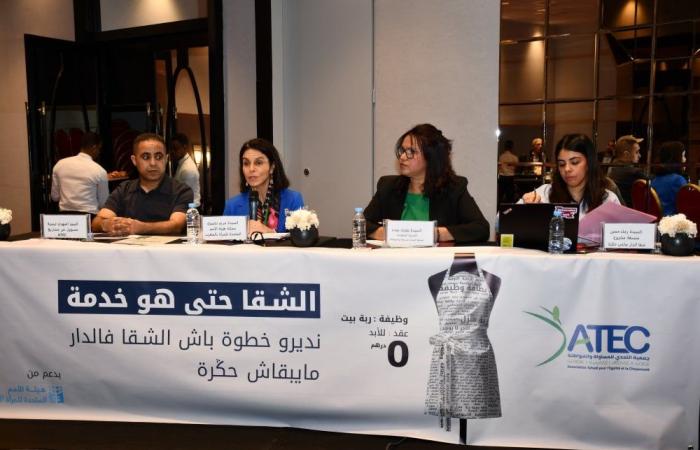In each home, they are millions to turn the daily wheel of everyday. They cook, clean, treat, accompany the children, watch over the elders. They organize, plan, anticipate. And yet, their work, as vital as it is, remains invisible, unpaid, and rarely shared. This May 1st, on the occasion of the labor festival, The Tahadi association for equality and citizenship (ATEC), with the support ofUN Women Moroccochose to rob the spotlight on this “injustice” so familiar that we end up seeing it anymore. Because behind each hot meal, each clean garment, each child accompanied at school, hides an often ignored work, however fundamental for the proper functioning of our society.
When the home becomes a place of claim
When press conference of April 30 announcing the launch of the initiative, Ms. Bouchra AbdouDirector of the ATEC, recalled the fundamental issue of this mobilization. “This initiative is part of our commitment to advance equality between women and men in Morocco. By making the work invisible visible, we contribute to deconstruct stereotypes and to lay the basics of a new social contract within homes ”. Ms. Abdou also recalled the High commission figures (HCP) If edifying: “Moroccan women provide more than 90% of the time devoted to domestic tasksor on average five hours a day, against only 43 minutes for men. This imbalance weighs heavily on their access to employment, training, participation in public life. He feeds gender inequalities from the home, ”she said. And to insist that: “Unpaid domestic work is one of the dead angles of our society. It is time to name it, to show it, to share it. ”
This awareness is also international. Myriem Ussirimanager ofUN Women Moroccosalutes this initiative which she inscribes in a global fight. “It is a question of recognizing the importance of these family responsibilities while encouraging men and boys to get more involved”. And to add that: “The unpaid work of women is a subsidy of the cost of care services supporting families and economies. He often compensates for the lack of social services, yet he is rarely recognized as work. ” Myriem Ussairi also underlines that the lack of recognition of domestic work limits the ability of women to engage in a remunerated activity, or forces them to combine two charges: that of the home and that of work. For her, change involves a deep transformation of mentalities. “We must contribute to a more equitable distribution of Tasks between men and women within families ”.
A long -term transformation project
Field actions are also planned, with support for families and an innovative mobile application to concretely measure the domestic burden within homes. This project is part of the UN Women’s “DARE TO CARE” regional programaimed at questioning patriarchal social norms and engaging men in a more equitable sharing of family responsibilities.
-For full and whole recognition
Three main objectives structure the approach. It is a question of raising awareness of large scale, by mobilizing more than 50,000 young people and local communities, strengthening the capacities of key actors (teachers, religious, journalists, associations …), and measure an effective reduction in domestic time through innovative tools.
This campaign, symbolically launched on May 1st, poses a crucial question: who really comes back from everyday life? And above all, why this work, however so essential, still so little valued?
“It is no longer a question of considering domestic tasks as an occasional help that we bring, but to question their unequal distribution, by fully recognizing their value and by sharing them in a fair way within the home, ”recalls Border the hminecoordinator of Listening centers of the ATEC association.
A new domestic pact is to be built, where each daily gesture would be recognized for what it is: a real work, which deserves visibility, respect and, above all, sharing.
Campaign activities
Throughout the 18 months of the “CH9A Dare Machi 7ogra” campaign, several activities are planned:
- Mobilization of young people via social campaigns and media.
- Organization of awareness activities in schools.
- Strengthening civil society organizations to ensure continuous dissemination of project messages.
- Massive broadcasting through the media (radio, television, social networks) and the production of creative content.
- Organization ofartistic events (public displays, wall frescoes, itinerant theater …) to carry messages in public space.
- Outfit University seminars And meetings-debates with influential actors.
- Development of a application mobile to raise awareness of the distribution of domestic working time.
- Family support To concretely measure the reduction in domestic time devoted by women.






